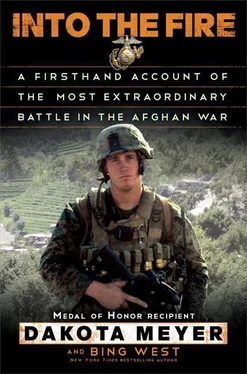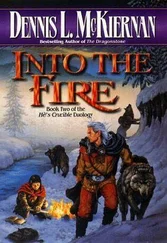“Doc Layton, put a tourniquet on this!” I screamed. Doc had something better to do now, the thing he had come for.
I gestured at two Askars to carry the wounded man down the metal outside stairs. Twice they dropped him as more rockets slammed in. Lt. Johnson saw that they were just killing the guy and he jumped up to take care of the situation. Doc Layton grabbed the 240 and started ripping off bursts as I put the wounded man over my shoulder and headed down the stairs. Halfway down, a rocket hit a truck next to the tower. I leapt the last flight of stairs and landed hard on the ground. Lt. Johnson ran out and stopped a Ford Ranger that was headed out of the area.
Lt. Johnson was screaming at our Askars to return fire. The rockets had them spooked. I lowered the wounded man into the truck bed. Lt. Johnson calmed down the driver and the Ranger drove toward the med station.
I climbed back up the tower to help Doc Layton, who was still blasting away with the 240. I turned around on the steps to see Johnson sprinting across the base to the mortar pit. A shriek and boom followed—a rocket hit the tree next to Johnson. I was okay, but I was sure it must have got the lieutenant. You can’t process what you just saw, or think you saw. But a few seconds later he emerged black-faced from the smoke, brushing off his clothes. We laughed about it as we kept shooting. I took over the 240 from Doc Layton. An enemy PKM machine gun had joined the fight, and some rounds were pinging off the tower. The enemy’s Russian PKMs and our 240s are a match, both shooting .308-caliber bullets at a rate of about 750 per minute.
“Where’s Staff Sgt. Kenefick?” I yelled.
Doc Layton pointed toward the northeast tower.
“Get over there and stay with him!” I yelled.
Suicide bombers sometimes rushed the wire, trying to take an infidel with them as they evaporated in a red flash. Without hesitating, Doc Layton ran down the stairs, across the open space, and into the tower with Staff Sgt. Kenefick. Two or three seconds later, a rocket slammed into their bunker, exploding to pieces an Afghan worker huddled there beside the sandbags. Smoke rolled out of the tower.
“They’re gone!” I yelled to Johnson, not believing what I had just seen.
I resumed firing. It’s all you can do. The best first aid at that point was to return fire. Johnson worked the radio.
“Fox 3-1, Fox 3-1, this is Fox 3, Staff Sgt. Kenefick, Doc Layton… Come on, man! Answer up!”
We kept firing, but it seemed unworldly now. We were on automatic. Lt. Johnson got on the radio again.
“Three-1, Fox 3-1, this is Fox 3, Staff Sgt. Kenefick, Doc Layton… Come on, man! Answer up!”
Then finally…
“Yeah, yeah, this is 3-1. We’re good.”
Ten minutes later, our attack helicopters began their strafing runs—low, rumbling brrrs , like a giant burping. Incredible firepower, those lovely birds. Enemy fire ceased. Attack over.
Johnson and I ran over to the smoking bunker, as Staff Sgt. Kenefick and Doc Layton stumbled out. The four of us sat on the bloody sandbags in the growing dusk, talking about it. Their eyes were slightly glazed and wide, wide open.
As a grunt, I was resigned about death. I don’t go to church. To me, organized religions seem like bureaucracies. But I believed in God. Grunts see His acts on the battlefield. Guys beside you get shot or blown up. You don’t. God has a plan that we won’t understand until we cross to the other side. There’s no sense obsessing about getting tagged. Either a bullet has your name on it or it doesn’t. No need for philosophizing.
Lt. Johnson, Staff Sgt. Kenefick, and Doc Layton, though, weren’t infantry. They had considered that by coming to Afghanistan they might die, but it hadn’t kicked in until now. Now they had heard the screams and seen the blood. Everybody, soot-covered, understood that now—that if we went home together, it might not be alive.
The Askars were cleaning up the bloody mess not six feet from us, taking away the ripped-up body of their friend.
We mumbled some stuff. All of us were too embarrassed to talk about our feelings, but we knew what we were all thinking: this shit was for real, and there were only the four of us.
“We’ll be there for each other,” Doc Layton said.
The surfer dude surprised me. He had said the one thing that made any sense.
We were always solid, but now it was as if we were stitched together, even while each of us thought the other three were hilarious nut cases. Lt. Johnson prowled the Afghan barracks, determined to stamp out the “RPG cigarettes.” Doc Layton, who’d never had a short haircut in his life, had decided that while his real calling was saving lives, you can’t do that if you’re dead. From now on, he was shooting back without waiting to be told. Staff Sgt. Kenefick was insufferable. His beloved Yankees had gone on a two-month tear and seemed destined for the World Series. Every time they won, he acted like he had been in the game. The staff sergeant also fancied himself quite the basketball player. I couldn’t wait to get him on a court and dunk the ball over his head. Then I’d hustle off before he discovered that was my one and only basketball move.
It wasn’t long after the rocket attack that we received a call saying we were needed at FOB Joyce to run a mission in the morning. We started prepping to go when we were told to stand by; the mission had been pushed back another day. Lt. Johnson told me to prepare to move our Afghan company down to Joyce. He wasn’t told what the mission was due to operational security.
I checked the ammo and water loads for our sixty-odd Askars. Whatever was ahead, it wasn’t a big deal. I figured it would be one more useless “key leader engagement” in one more mountain village, like dozens of others.
In the afternoon of September 7, 2009, our convoy of about eight vehicles drove south. When we got to Joyce we found out that our mission was to provide security for a key leader engagement in a mountain village named Ganjigal. Ganjigal lay two miles north of Joyce and we drove right by the mouth of the valley. Ganjigal sounded like the name of an Irish town, full of smiling faces and friendly pubs. I could see a few of the larger compounds far back on a hillside, nestled against steep ridgelines.
“Bad place,” Hafez muttered. “Bad people.”
That got my attention. Hafez, who knew every village in Kunar, rarely pointed one out as more hostile than the others. It didn’t make me fearful, but my antennae were raised. I was suddenly more aware of my gunnery mission as it related to the team.
Located two miles north of Joyce, Ganjigal Valley was an infiltration corridor from next-door Pakistan. Video from night cameras on unmanned aerial vehicles showed donkey trains wending their way up to the border, smuggling out cedar planks and bringing in arms. You couldn’t call a fire mission on donkeys and shepherds, though, and U.S. patrols rarely ventured up the valley, because Battalion 1-32 was overextended protecting the main convoy routes.
Occasional shots from the valley were fired at passing U.S. convoys. Yet unarmed Askars casually walked to a market just outside the valley, with no fear of being targeted. The local understanding seemed to be: don’t bother us, and we won’t bother you.
* * *
A few weeks earlier the local truce had broken down. Rockets fired from the ridge above Ganjigal had ignited a huge fuel fire inside Joyce. Fearing retaliation, Ganjigal elders trooped down to Joyce for a shura , or a palaver. They proposed that the Americans hire workers from Ganjigal and pay for a tribal militia that would stop the rockets. The Afghan border police commander, Lt. Col. Ayoub, believed the villagers were mostly Taliban, and he reacted angrily to what he understood as a demand bribe to stop the rockets.
Читать дальше












